Poetry
Poetry

The Public World / Syntactically Impermanence
The Public World / Syntactically Impermanence is a rich consideration of the strategies of poetry, and the similarities between early Zen thought and some American avant-garde writings that counter the language of determinateness, or conventions of perception. The theme of the essays is poetic language which critiques itself, recognizing its own conceptual formations of private and social, the form or syntax of the language being syntactically impermanence.
Whether writing reflexively on her own poetry or looking closely at the writing of her peers, Leslie Scalapino makes us aware of the split between commentary (discourse and interpretation) and interior experience. The poetry in the collection is both commentary and interior experience at once. She argues that poetry is perhaps most deeply political when it is an expression that is not recognized or readily comprehensible as discourse.

Notes on a life not lived
This publication is based on a project by Despina Vassiliadou that ran from 2015-16. It presents a collection of photographs taken during the period, accompanied by fictional short stories.

Eecchhooeess
American poet Norman H. Pritchard's second and final book, EECCHHOOEESS was originally published in 1971 by New York University Press. Pritchard's writing is visually and typographically unconventional. His methodical arrangements of letters and words disrupt optical flows and lexical cohesion, modulating the speeds of reading and looking by splitting, spacing and splicing linguistic objects. His manipulation of text and codex resembles that of concrete poetry and conceptual writing, traditions from which literary history has mostly excluded him. Pritchard also worked with sound, and his dynamic readings—documented, among few other places, on the album New Jazz Poets (Folkways Records, 1967)—make themselves heard on the page.
EECCHHOOEESS exemplifies Pritchard's formal and conceptual sensibilities, and provides an entryway into the work of a poet whose scant writings have only recently achieved wider recognition. DABA's publication of EECCHHOOEESS is unabridged and closely reproduces the design of the original 1971 volume.
Norman H. Pritchard (1939-96) was affiliated with the Umbra group, a predecessor to the Black Arts Movement. He taught writing at the New School for Social Research and published two books: The Matrix: Poems 1960-1970 (Doubleday, 1970) and EECCHHOOEESS (New York University Press, 1971). His work was anthologized in publications including The New Black Poetry (1969), In a Time of Revolution: Poems from Our Third World (1969), Dices or Black Bones: Black Voices of the Seventies (1970), Ishmael Reed's 19 Necromancers from Now (1970), Text-Sound Texts (1980) and others.

Supplication: Selected Poems of John Wieners
Supplication: Selected Poems of John Wieners gathers work by one of the most significant poets of the Black Mountain and Beat generation. Includes poems that have previously never been published, the full text of the 1958 edition of his influential The Hotel Wentley Poems, plus poems from rare sources, facsimiles, notes, and collages by Wieners. An invaluable collection for new and old fans.
John Wieners (1934-2002) was a founding member of the New American poetry that flourished in America after the Second World War. Upon graduating from Boston College in 1954, Wieners enrolled in the final class of Black Mountain College. Following Black Mountain's closure in 1956, he founded the small magazine Measure (1957-1962) and embarked on a peripatetic life, participating in poetry communities in Boston, San Francisco, New York, and Buffalo throughout the late 1950s and 1960s, before settling at 44 Joy Street in Boston in 1972. He is the author of seven collections of poetry, three one-act plays, and numerous broadsides, pamphlets, uncollected poems, and journals. Robert Creeley described Wieners as the greatest poet of emotion of their time.

Fleurs du Mal
Charles Baudelaire, Antoine D'Agata
For Charles Baudelaire, the photographic medium is not an art but a technical means of representing reality. As a counterpoint to Baudelaire, Antoine d’Agata reworks his own photographs through digital intervention to return to engraving, as if to go from the pixel to the line of the time. He pushes photography to its limits, discarding the medium to return to the raw. Baudelaire’s texts thus enter into dialogue with photographs that have become engravings through wear and tear and manipulation, where the bodies blend together to give way to the poetry of the body.
The work is based on the original uncensored edition of Baudelaire’s collection accompanied by these engraved prints by d’Agata. Present and past are superimposed. Like a game of transparency that will present the frame of an image on the cover. In this work Fleurs du Mal, Baudelaire is a stroller, a spectator of the world around him, of urban transformations, while d’Agata embodies photography, life and reappropriates the space of the city by the gesture.
Two personalities meet on the occasion of the 200 years of the birth of Charles Baudelaire. Two artists who could have meet each other, debated, confronted each other. For d’Agata, Baudelaire leaves a legacy that must be pushed to extend its own reflection.
The artist intervenes on the edge of Baudelaire’s poems with personal reflections and quotations from his favorite thinkers, descendants of Baudelaire’s thought: Walter Benjamin, Guy Debord or Georges Bataille.
Affixed vertically to the poems, these handwritten interventions assert themselves while leaving the original text its own space. A second sense of reading is thus offered to the reader between Baudelaire’s text and the interpretation given by d’Agata through the words as much as through the engravings.

Responses to Derek Jarman’s Blue
Responses to Derek Jarman's Blue is the third publication in a series of anthologies from Pilot Press seeking contemporary responses to works of art made during the AIDS crisis.
In this third iteration, responses were sought to the 1993 film Blue by the multidisciplinary artist Derek Jarman.
Contributors
In order of appearance
Roelof Bakker
Jared Davis
Becca Albee
Linda Kemp
Ashleigh A. Allen
David Nash
Sam Moore
Anton Stuebner
Gonçalo Lamas
Olivia Laing
Nate Lippens
Jason Lipeles
JP Seabright
Andrew Cummings
Sig Olson
Maria Sledmere
Cleo Henry
Jessie McClaughlin
Lars Meijer
Scott Treleaven
Declan Wiffen
Caitlin Merrett King
Harry Agius
António Manso Preto
Adriana Lazarova
Brooke Palmieri
D Mortimer
Mary Manning
Aaron James Murphy
Printed on 100% recycled paper
Published by Pilot Press, 20 × 15 cm, Softcover, 2022

Slangen
Slangen krioelen in de sarcofaag van het heden, in de krochten van de popcultuur, in de mummie van de natuur, in wondes en rot vlees, in artificiële woestijnen en op geoliede dad bods. Ze wentelen zich rond beursgrafieken, raken verstrengeld met wurgende algoritmes, orkestreren een trage ondergrondse revolutie. Een meisje snijdt zich aan een nepdiamanten piramide en werpt haar slangenvel van zich af.
Dominique De Groen is schrijver en beeldend kunstenaar. Ze publiceerde de dichtbundels Shop Girl (2017), Sticky Drama (2019) en offerlam (2020). Ze werd genomineerd voor de Poëziedebuutprijs Aan Zee 2018, de Herman de Coninckprijs 2020 en de Fintroliteratuurprijs 2021 en won de Frans Vogel Poëzieprijs 2019 en de Fintropublieksprijs 2021.

EN
In het begin van de jaren 1970, hield Guy Rombouts een notaboekje bij waarin hij alle woorden, bijvoeglijk naamwoorden en werkwoorden bijhield die hij tegenkwam tijdens het lezen en die met elkaar verbonden waren door het voegwoord ‘en‘.
Ongeveer 50 jaar later en met de hulp van de grafische vormgever Jeroen Wille, is de transcriptie van zijn aantekeningen gepubliceerd als een boek dat gelezen kan worden in twee richtingen (en als enige boek coronaproof met twee tegelijkertijd).
Het boek bevat 2158 verzen met in totaal 4316 EN-combinaties.
De kortste verzen met evenveel letters:
A EN Z
4 EN 6
De langste verzen met evenveel letters:
ONUITSPREKELIJKHEDEN EN IMPONDERABILIA
ONEVENWICHTIGHEID EN ZELFOVERSCHATTING

Nasleep
Nasleep neemt de protesten rondom het Gezi Park in 2013 als vertrekpunt en verkent gaandeweg wat er is overgebleven van dit historische moment waarin een andere wereld voor het grijpen leek. Het zijn gedichten die laveren tussen ritmische, conceptuele en kritische noise enerzijds en postrevolutionaire affecten anderzijds, tussen politisering enerzijds en onmacht en radeloosheid anderzijds.

Vloekschrift
‘Arno Van Vlierberghe makes an impressive entrée into the poetry scene in the Low Countries with his first collection Vloekschrift, nominated for the C. Buddingh’-prize for the best debut volume of verse.’ (Patrick Peeters on Poetry International Web)
Arno Van Vlierberghe (1990) is dichter. Hij leeft, woont en werkt in Gent. Zijn werk verscheen her en der, offline en online. Vloekschrift is zijn debuutbundel.

Time Is A Mother
How else do we return to ourselves but to fold
The page so it points to the good part
In this deeply intimate second poetry collection, Ocean Vuong searches for life among the aftershocks of his mother's death, embodying the paradox of sitting within grief while being determined to survive beyond it. Shifting through memory, and in concert with the themes of his novel On Earth We're Briefly Gorgeous, Vuong contends with personal loss, the meaning of family, and the cost of being the product of an American war in America. At once vivid, brave, and propulsive, Vuong's poems circle fragmented lives to find both restoration as well as the epicenter of the break.
The author of the critically acclaimed poetry collection Night Sky With Exit Wounds, winner of the 2016 Whiting Award, the 2017 T. S. Eliot Prize, and a 2019 MacArthur fellow, Vuong writes directly to our humanity without losing sight of the current moment. These poems represent a more innovative and daring experimentation with language and form, illuminating how the themes we perennially live in and question are truly inexhaustible. Bold and prescient, and a testament to tenderness in the face of violence, Time Is a Mother is a return and a forging forth all at once.
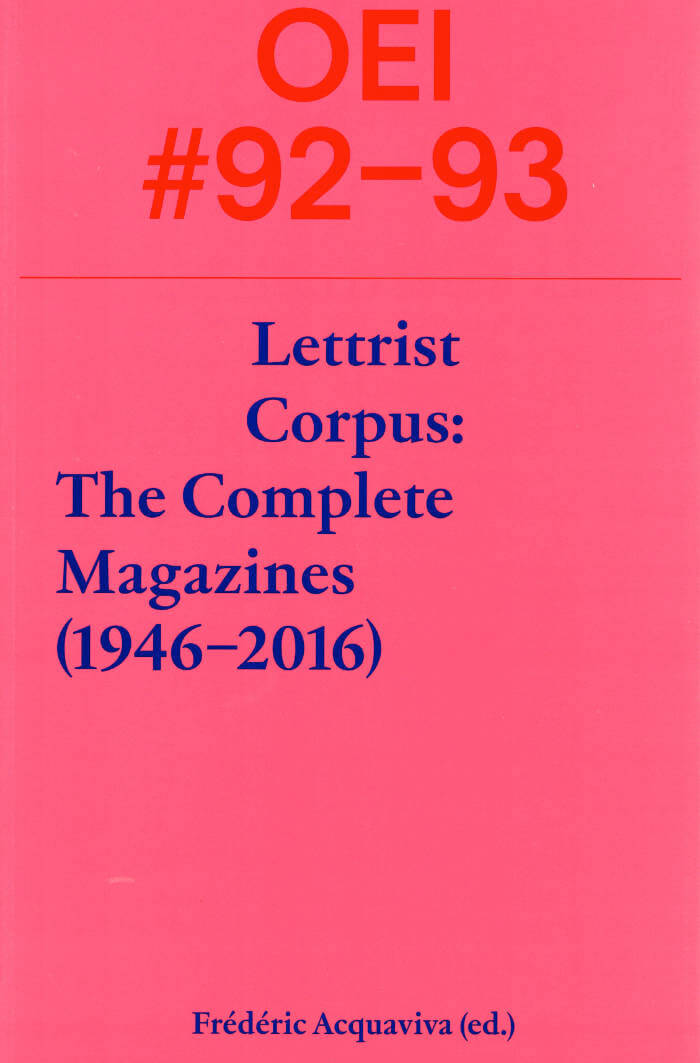
OEI #92-93 Lettrist Corpus: The Complete Magazines (1946–2016)
Frédéric Acquaviva, Jonas J. Magnusson and 1 more
“Un livre qui fera date. Deux ans de recherches, 512 pages, 1.361 illustrations en quadrichromie, 119 revues lettristes parues de 1946 à 2016 pour un total de 1.200 ouvrages décrits (avec la couverture et le sommaire de chaque numéro). Qui d’autre que les éditeurs suédois de OEI (Jonas J. Magnusson et Cecilia Gronberg) aurait pu sortir ce travail anthologique? Personne!” — www.mauricelemaitre.org
“The ‘unreasonable’ idea for this ‘catalogue raisonné’ came to me as an attemps to draw up a complete inventory of all the journals and periodicals of the Lettrist group, from its birth until today. Because the lifespan of the Lettrist movement has exceeded that of all the other avant-garde movements, we are undoubtedly in front of the most immense corpus ever produced in terms of magazines, coverin a period from 1946 to 2016. It presents more than a hundred different titles with more than one thousand items and hundreds of authors. . . . I hope that this comprehensive work will give the reader an opportunity to understand the different paths of the Lettrist groups and the many areas addressed, if not shaken, beyond the books of Isidore Isou and Maurice Lemaître. Since other Lettrists have published relatively few monographic books, and very little outside their own magazines, OEI #92-93 is a unique database for most of the Lettrist texts that we can access, also making it possible for new readers to come across Lettrism.”
— from Frédéric Acquaviva’s introduction
Design by Fält
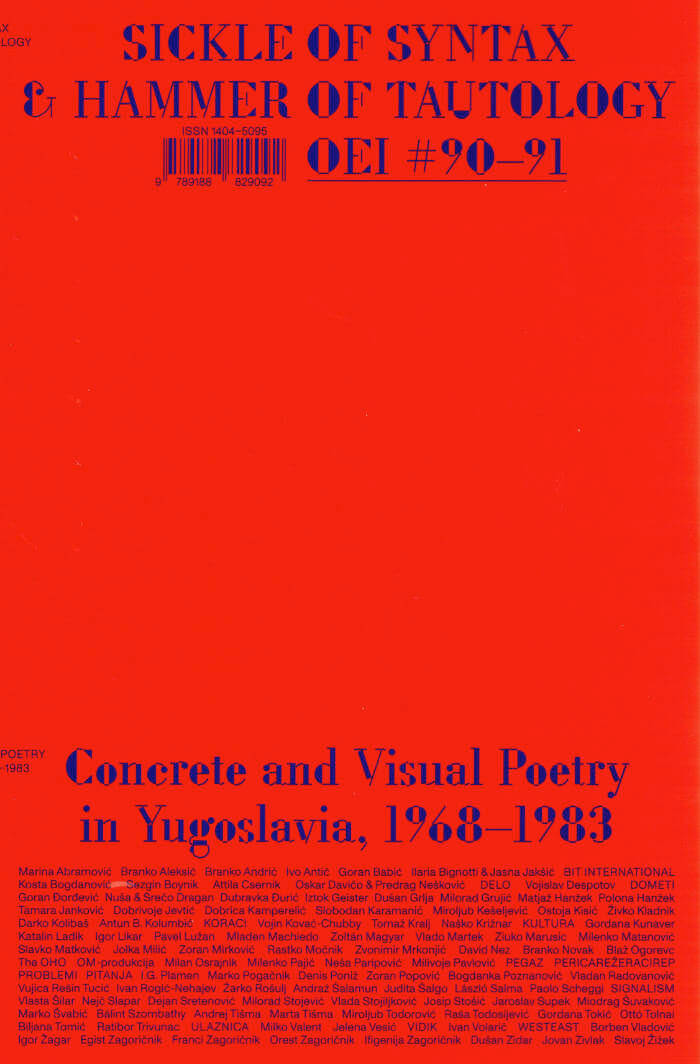
OEI #90/91 Sickle of Syntax & Hammer of Tautology
Tobi Maier, Cecilia Grönberg and 1 more
OEI # 90-91: Sickle of Syntax & Hammer of Tautology offers the first English language overview of the history of concrete and visual poetry production in socialist Yugoslavia between 1968 and 1983.
By focusing on mass-produced examples of concrete poetry, this publication presents these poetic experiments as organically linked to social movements, critical theories, and youth cultural revolutions. In his extensive introduction, Sezgin Boynik, the guest editor of this special issue of OEI, discusses concrete and visual poetry in socialist Yugo-slavia as an uneven and combined development, and emphasizes its confrontational and organizational aspects.
By means of interviews, translations, reproductions, and theoretical and historical statements, OEI # 90-91 offers a picture of a very lively scene of concrete and visual poetry in Yugoslavia, which unfortunately is not as recognized interna-tionally as it would deserve.
Hoping that OEI # 90-91 could contribute to this task in a substantial way, we present episodes from the early years of OHO formation and its complex theories of words and things; an interview with Rastko Močnik on programmed art and political formalism; militant polemics of Goran Babić; Signalist contradictions; subjective structural devices of Judita Šalgo; zaum experiments of Vojislav Despotov; detective meta-texts of Slavoj Žižek; poetic self-management studies of Vujica Rešin Tucić; a feminist historicisation of Ažin school for experimental poetry; democratisation of visual poetry by Westeast; selections from special issues of the journals Pitanja, Problemi, Ulaznica, Dometi, Delo, Koraci, Vidik, Pegaz, and many other materials translated here for the first time and presented in one publication.

OEI #86/87 Publishing Practices, Publishing Poetics
Tobi Maier, Cecilia Grönberg and 1 more
Once more, an astonishing issue of OEI – a thrilling, compelling, stimulating feast of ideas regarding publishing and the book: the perfect big companion to read and hug in bed while the virus spreads outside.
Bringing together contributions from circa 130 publishing structures, publishing communities, magazines, small press endeavors, artists, poets, writers, editors, theoreticians, curators, scholars, and art bookstores, OEI # 86–87 reflects upon the challenges, pressures and possibilities of publishing and creating publics in different contexts and places in a time of far-reaching – economical, medial, political, social, technological – transformations.
The potential and the versatility of publishing open it to a diversity of practices and approaches in the arts, but as an eminently social form of art, a collective or micro-collective work with shared responsibilities, it is also a never-ending process of “crafting a variegated approach to how you create, publish, distribute, and build a social ecosystem around your efforts”, of trying to “build up and strengthen the community around these printed forms” (Temporary Services).
It is the conviction of OEI #86–87 that print has the power to play an important part in the construction of social spaces, of a social world. As Benjamin Thorel puts it in one of the essays in the issue, “conceiving of the dynamics of publishing as making publics as well as making things public is not a pun – insofar as the artists/publishers encompass, beyond the book itself, its possible ‘lives’, imagining the different spaces, and the different people, amongst whom a publication will circulate.” This is what Michael Warner has called “a public [as] poetic worldmaking”, implying “that all discourse or performance addressed to a public must characterize the world in which it attempts to circulate, projecting for that world a concrete and livable shape, and attempting to realize that world through address.”
This is also, as stressed by Annette Gilbert and others, what can make publishing such an active force, a force co-constituting texts and publications and publics. Indeed, with Michalis Pichler, it is tempting to say that in publishing as practice – perhaps more than in any other art field – “artists have been able to assert the aesthetic value of their own socio-politically informed concerns and to engage, often under precarious conditions, in cultural activities fully aligned with their political values.”
OEI #86–87 also includes sections on and with contemporary poetry from Canada; Fluxus publishing; Krister Brandt/Astrid Gogglesworth; Kalas på BORD (Öyvind Fahlström); Lars Fredrikson; Claude Royet-Journoud’s poetry magazines; Carl Einstein; Gail Scott; Ållebergshändelser; OEI #79: edit/publish/distribute!; “det offentligas försvinnande” and many many other things. [publisher’s note]
Design by Konst & Teknik

OEI #82-83 Art in the Age of Kleptomania
Jonas J. Magnusson, Cecilia Grönberg and 1 more
Aeron Bergman and Alejandra Salinas, co-editors at INCA Press (along with Irena Borić), are the guest-editors of this issue of OEI: it contains essays, artworks, and archival materials by 21 artists, theorists, writers, and artist-run spaces (mostly from the Americas).
The subject of the issue is art and neoliberalism, and it encompasses essays, images and other works by Dorothée Dupuis, Max Jorge Hindered Cruz, Luciano Concheiro, Yvonne Osei, Diego Bruno, John Riepenhoff, Suhail Malik, Good Weather, The Luminary, Bikini Wax, Beta-Local and more.

OEI #80/81 The Zero Alternative
Tobi Maier, Cecilia Grönberg and 1 more
OEI #80-81 is not an anthological publication, and has no representative ambition. It is a montage-based publication trying, in as material a way as possible, to register, prolong, transform and reflect upon energies from the work of Portuguese artist Ernesto de Sousa and his fellows (Alberto Carneiro, Túlia Saldanha, Álvaro Lapa, Fernando Calhau, Lourdes Castro, Ana Vieira, Ana Hatherly, E.M. de Melo e Castro, António Barros...).
Ernesto de Sousa and his fellows defined themselves as aesthetic operators and worked as filmmakers, photographers, curators, critics, writers, folk art researchers, multimedia artists... OEI #80-81 also gathers texts on magazines such as Poesia Experimental, Operação, Nova, A Urtiga, and Alternativa; and works by artists from younger generations such as Isabel Carvalho, Paulo Mendes and Mariana Silva, in dialogue with that of de Sousa.
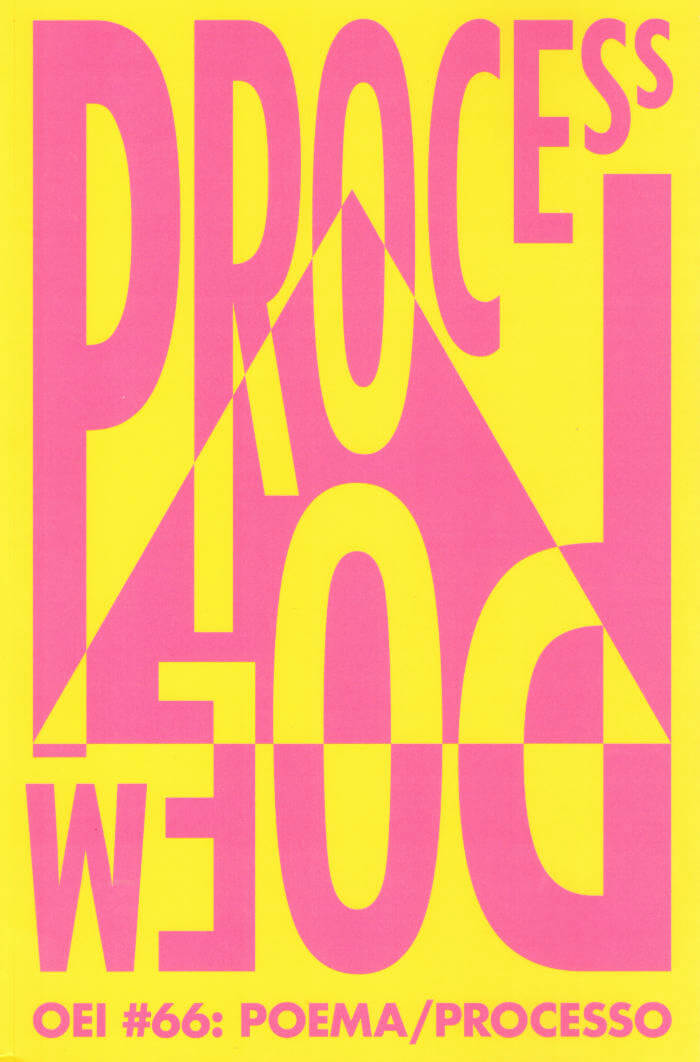
OEI #66 Poema/Processo (Process/Poem)
Jonas J. Magnusson, Cecilia Grönberg and 1 more
“We were not claiming European influences, as concrete poetry did. Europe would not accept a visual culture born in Brazil, so this claiming was necessary for concrete poetry, but not for poema/processo as it had pan-Latin-American connections” (Wlademir Dias-Pino)
Already a classic, this issue of OEI presents the Brazilian avant-garde movement Poema/Processo through a huge selection of images, poems, and short essays, showing the different strategies this movement used between 1967 an 1972 in order to survive and develop under the pressure of the militarian regime. Are also featured three other less-known Brazilian movements from the 60s, 70s and early 80s: poesia práxis, poesia marginal, pornismo.
With Wlademir Dias-Pino, Wlademir Dias-Pino, Moacy Cirne, Álvaro de Sá, Fernanda Nogueira, Priscilla Guimarães Martins, João Felício dos Santos, Rogerio Camara, Neide de Sá, Eduardo Kac, Antonio Sergio Bessa, Décio Pignatari, Luis Ângelo Pinto, Décio Pignatari, Dailor Varela, Falves Silva, Jota Medeiros, Cristina Freire, Dácio Galvão, Clemente Padín, Almandrade, Mário Chamie, Sergio Cohn, Omar Khouri, Régis Bonvicino, Regina Silveira, Hudinilson Jr.
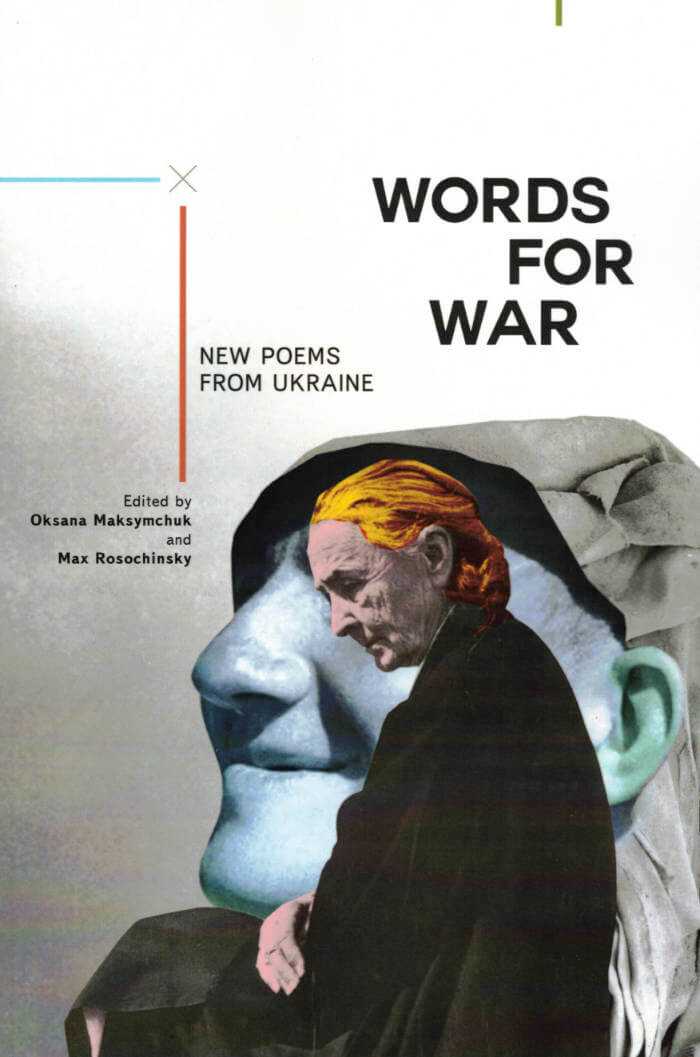
Words For War
The armed conflict in the east of Ukraine brought about an emergence of a distinctive trend in contemporary Ukrainian poetry: the poetry of war. Directly and indirectly, the poems collected in this volume engage with the events and experiences of war, reflecting on the themes of alienation, loss, dislocation, and disability; as well as justice, heroism, courage, resilience, generosity, and forgiveness. In addressing these themes, the poems also raise questions about art, politics, citizenship, and moral responsibility.
The anthology brings together some of the most compelling poetic voices from different regions of Ukraine. Young and old, female and male, somber and ironic, tragic and playful, filled with extraordinary terror and ordinary human delights, the voices recreate the human sounds of war in its tragic complexity.

Piero Heliczer. Poems & Documents / Poèmes & Documents
Sophie Vinet, Benjamin Thorel and 1 more
Poet, editor, filmmaker, actor, child star in Mussolini’s Italy, founder of The Dead Language Press and of the Paris Filmmakers Cooperative, Piero Heliczer (1937–1993) was an essential yet secret agent of the 1960s and ’70s counterculture. In the course of his nomadic existence in Rome, New York, London, Amsterdam, Paris, and Préaux-du-Perche, where he spent the last few years of his life, he met and worked with a constellation of avant-garde writers, forged friendships with figures from the Beat Generation and the British Poetry Revival as well as the New York art scene. At the crossroads of many underground experiences, Heliczer’s name appears in books dedicated to the artists and poets he collaborated with during his lifetime—names by the likes of Gregory Corso, Barbara Rubin, Andy Warhol, Jack Smith, Ira Cohen, or The Velvet Underground, a band he participated in creating with his friend Angus MacLise.
This myth obscures the fact that Piero Heliczer was first and foremost a poet. Today, this part of his work is overlooked; it is all the more difficult to encounter because Heliczer himself never collected it. So it was scattered, or lost, in the course of his wanderings. Heliczer favored the circulation of his works rather than their archiving: he was committed to the production of mobile forms—flyers, broadsides, and other ephemera—disseminated his verses in magazines, and preferred public readings and performances to the finished form of the book.
The present volume gathers a significant number of Heliczer’s poetic works through facsimile reproduction of his contributions to more than thirty periodicals—mostly stemming from poets’ presses or universities—published between 1958 and 1979. This collection isn’t “complete”—but it makes available again poems that, in some cases, never circulated after their initial publication.
Un recueil de poèmes de Piero Heliczer (1937–1993), auteur, éditeur et cinéaste, figure de l’underground et de la contre-culture, proche de Andy Warhol, Gerard Malanga, et Jack Smith. Sa poésie, héritière de la Beat Generation, restitue en métaphores et images saisissantes des expériences et des visions personnelles, tout en s’appuyant sur des formes héritées de la tradition anglaise et des partis-pris typographiques originaux. Ce recueil rassemble des facsimilés des publications originales de poèmes de Heliczer – périodiques d’artistes, revues miméographiées, petits magazines… – accompagnées de leurs traductions en français, ainsi que de plusieurs documents, parmi lesquels une reproduction intégrale d’une publication rare de 1961, Wednesday Paper, et, en insert, un facsimilé d’un placard de 1975, The Handsome Policeman.
Traduction des poèmes: Rachel Valinsky
Publié avec l’aide du CNAP
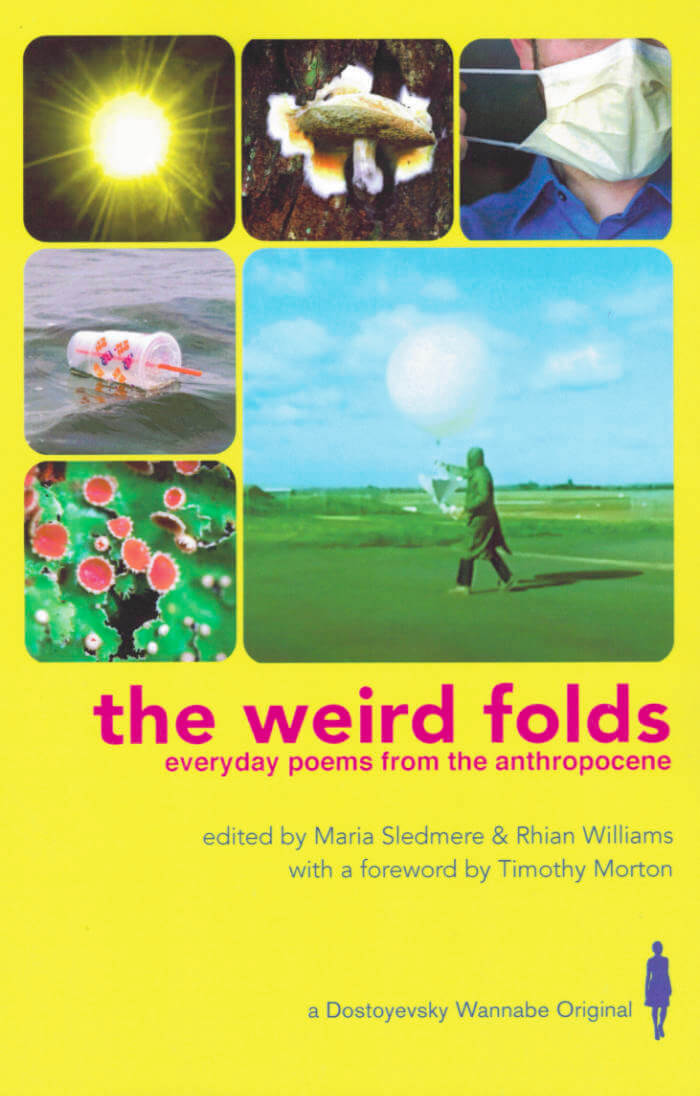
the weird folds: everyday poems from the anthropocene
Rhian Williams, Maria Sledmere
Edited by Maria Sledmere and Rhian Williams, the weird folds: everyday poems from the anthropocene is an edited anthology of poetry by contemporary UK writers, whose work manifests ecology in the body, in language, in lyric and colour and play. A book that arrives with its own weather, an acid-bright sense of urgency, detail and care; a book that speaks to a nowness that slides between crisis and the everyday arts of noticing which bear us through massive scalar change, survival and sorrow.
As Bernadette Mayer writes in 'The Way to Keep Going in Antarctica': 'Do not be afraid of your own heart beating / Look at very small things with your eyes / & stay warm'. Riffing on the etymology of 'anthology' as a gathering of flowers, this book samples from a luminous range of poets responding to 'the anthropocene' as a kind of thought device for grasping extinction, global heating and climate breakdown.
'Poems are the future sliding against the past', writes Timothy Morton in the book's foreword; these works perform the shimmering art of recognising the multiple temporalities, tenses and agencies, problems and potentials of this fraught term, 'the anthropocene'.
The weird folds intervenes in more traditional canons of nature and ecopoetry to offer a poetics of the anthropocene which is thoroughly generous, queer, sensuous, formally innovative, relational, occult, fugitive and critically sensitive to the mediations of technology and culture which shape our encounters with the more-than-human.

Haiku
Haiku originated in New York City in 1964, when Beat Generation poet Diane di Prima gave West Coast assemblage artist George Herms a series of seasonal poems that would lead him to create a suite of woodcuts illustrating them.
Diane di Prima (1934-2020) was a poet whose writing, activism, and organizing helped define the Beat Generation. She has published more than thirty collections of poetry, as well as memoirs and short stories. She was named Poet Laureate of San Francisco in 2009 and has received the National Poetry Association's Lifetime Service Award.
George Herms (born 1935 in Woodland, California) is an artist/alchemist whose work finding the beautiful in found and discarded objects has led to his being known as one of the founders of the West Coast “assemblage” movement. He has created jazz-inspired sculpture, installations, paintings, drawings, prints, and music all based on an ethics of discovery, rearrangement, and play.

Sekxphrastiks
"How to write about a poet as honed? I wish for this magic in every book of poems I open, but it rarely is. Jane Goldman raps from inside our heads, do you get it, do you hear this, it is time to understand these things, these raw-lipped dadas without you-At the same time, her book pulls itself around us, and we get a new feeling about poetry, a subject we thought we knew well. I LOVE THIS BOOK!!! WOW RIGHT FROM THE START AND IT JUST GOES GOES GOES!!!" - CAConrad, author of While Standing in Line for Death (Wave Books, 2017)
Jane Goldman lives in Edinburgh and is Reader in English at the University of Glasgow. She likes anything a word can do. Her poems have appeared in a number of magazines and anthologies, as well as in the weird folds: everyday poems from the Anthropocene, edited by Maria Sledmere and Rhian Williams (Dostoyevsky Wannabe, 2020), and in the pamphlet, Border Thoughts (Sufficient Place/Leamington Books, 2014). SEKXPHRASTIKS is her first full length collection.
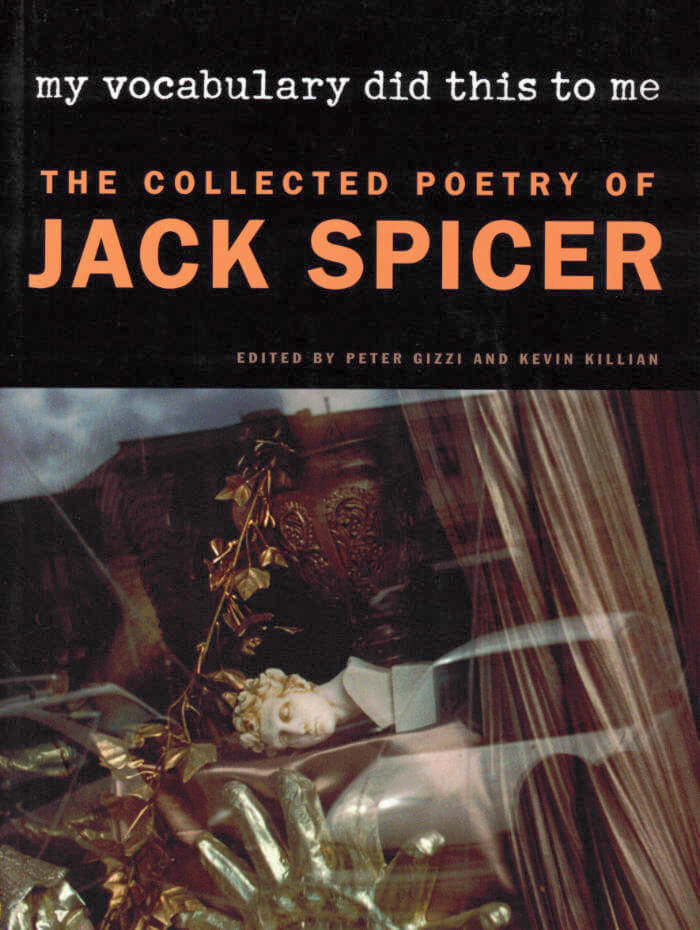
My Vocabulary Did This to Me: The Collected Poetry of Jack Spicer
In 1965, when the poet Jack Spicer died at the age of forty, he left behind a trunkful of papers and manuscripts and a few copies of the seven small books he had seen to press. A West Coast poet, his influence spanned the national literary scene of the 1950s and '60s, though in many ways Spicer's innovative writing ran counter to that of his contemporaries in the New York School and the West Coast Beat movement. Now, more than forty years later, Spicer's voice is more compelling, insistent, and timely than ever. During his short but prolific life, Spicer troubled the concepts of translation, voice, and the act of poetic composition itself.
My Vocabulary Did This to Me is a landmark publication of this essential poet's life work, and includes poems that have become increasingly hard to find and many published here for the first time.
Edited by Kevin Killian and Peter Gizzi
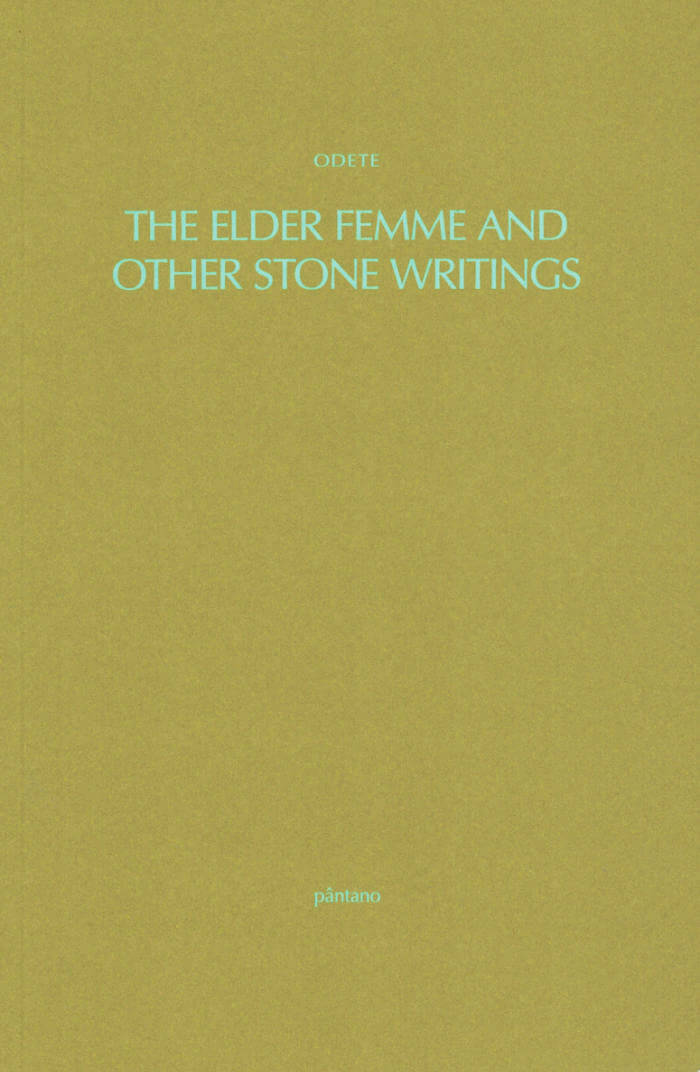
The Elder Femme and Other Stone Writings
The Elder Femme and Other Stone Writings is Odete’s first poetry collection. What starts as an essayistic archaeology searching for traces of transgender lives in mythical Antiquity soon branches off into myriad poetic and visual forms, from intimate free verses and scribbled notes to historical reports, earthy speculations, and magical enchantments. Weaving both English and her native Portuguese, there is a porosity and impermanence to Odete’s language. Equally evocative and testimonial, the book offers, in Odete’s own words, a “paranoid archaeology” that dilutes the borders between the personal and the collective. The Elder Femme works as portal, voicing those that came before and those still to come, as in its opening poem: “one day/ i’ll thank her/ my mother/ for teaching me/ how to glue/ shattered vases”.
Odete is a multidisciplinary artist working between the fields of music, visual arts, writing, performance, and theatre, born in Porto in 1995. Her writings have previously appeared in Trains Magazine, Tranfeminist Zine, and others. Her work in music includes the edited EPs and albums THE CONSEQUENCES OF A BLOOD LANGUAGE (Genome 6.66 Mbp, 2021); Water Bender (New Scenario, 2020); For those who are bored paranoid(Self-release, 2019); Mooring (Rotten: Fresco, 2019); and Matrafona(Naivety, 2018). Her performances have been presented at Teatro São Luiz (Lisbon), CTM Festival (Berlin), BOCA Biennial of Contemporary Arts, MAAT Museum (Lisbon), Galeria Municipal do Porto (Porto), and Teatro Municipal Campo Alegre (Porto). In 2020 she won the ReXform Award for performing arts, from which resulted the project On Revelations and Muddy Becomings on which her first book is based.
Published 2021.
150 copies, first edition, original in English and Portuguese bilingual